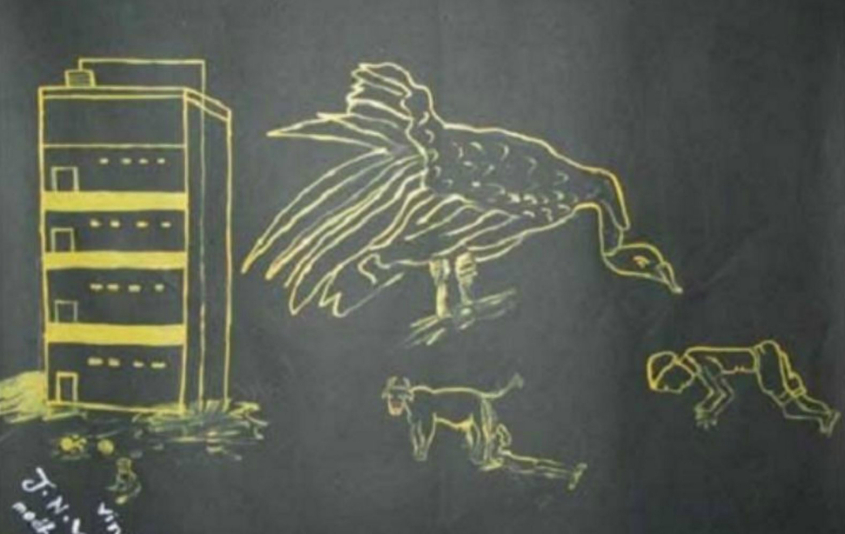
Image of jallachatu. Jallachatu is believed to occur when a vulture flies over the mother during pregnancy. Drawing from an exhibition on malnutrition in Bihar by artist Vinoy Jha.
This month’s featured paper is from Public Health Nutrition and is entitled ‘Health-seeking behaviour and community perceptions of childhood under-nutrition and a community management of acute malnutrition (CMAM) programme in rural Bihar, India’. Médecins Sans Frontières’ (MSF) qualitative study is based on narrative interviews of over one hundred and fifty family members of severely malnourished children.
Co-authored by Doris Burtscher and Sakib Burza, the study examines MSF’s six-year community-based management of acute malnutrition (CMAM) programme in Darbhanga district of Bihar, India. The study focuses on social, cultural and behavioural aspects of health-seekers. The majority of the people who were interviewed said they did not perceive childhood under-nutrition as a disease or a life-threatening condition. The paper highlights that the limited understanding of the condition leads to poor health-seeking practices within communities. Malnourished children are denied medical treatment because their parents tend to seek traditional healers or local treatment instead of a doctor at a nearby, government-approved, healthcare facility. The study also identifies social and cultural norms that influence the attitude of health-seekers toward treatment and care for malnutrition.
The study suggests that CMAM programmes must make an effort to involve communities and traditional healers and develop a holistic approach to ensure adequate medical treatment for malnourished children. The study helps provide guidance to community and nutritional healthcare workers to encourage communities to recognize under-nutrition as a medical condition - a condition which can be treated within the existing primary health structure, using community-based resources.
MSF continues to work in Bihar to provide medical treatment to severely acute malnourished (SAM) children. They believe it is imperative to sensitize communities towards the symptoms and debilitating effects of childhood malnutrition. In a country where there are 8 million SAM children, ensuring that communities seek timely and appropriate treatment for their undernourished children, will go a long way in saving lives.
To read the study in full, please click here.
MSF in Darbhanga, Bihar
In close collaboration with the Bihar State Health Society, MSF has treated more than 17,000 SAM children aged between six months and five years since 2009. The CMAM model encompasses; case detection by Accredited Social Health Activists (ASHAs) or community health workers at a community level, medical treatment for SAM children within the PHCs at the village level, and a stabilization centre/Nutritional Rehabilitation Unit (NRU) at the block level to treat SAM with minor complications. Additionally, at the district level, in collaboration with the Darbhanga Medical College and Hospital, a Malnutrition Intensive Care Unit (MICU) was set up in March 2014 to treat SAM patients with serious medical complications. So far, the MICU has treated more than 300 complicated cases of SAM in the district. To know more about the project in Bihar, please click here.
MSF in India
MSF is an international, independent, medical humanitarian organisation that delivers emergency aid to people affected by armed conflict, epidemics, exclusion from healthcare and natural disasters. MSF has been working in India since 1999, and provides medical treatment to thousands of patients in Andhra Pradesh, Bihar, Chhattisgarh, Jammu and Kashmir, Maharashtra, Manipur and Telangana. To obtain the latest information on MSF's medical humanitarian work in India and around the world, visit their website.
